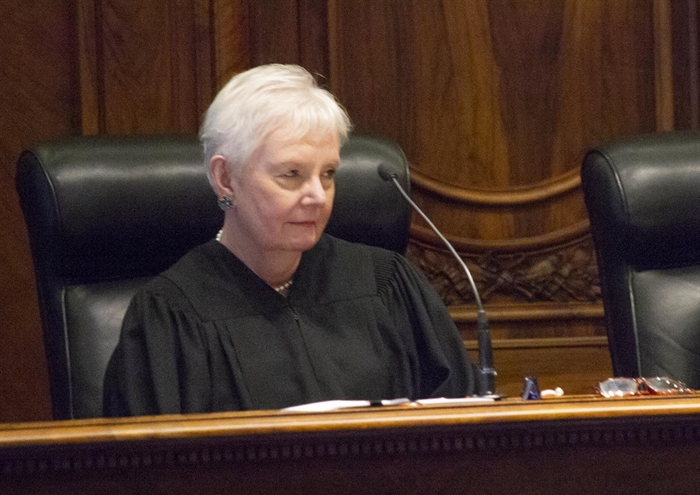Illinois Supreme Court weighs assault weapons ban; case centers on narrow questions of state constitution

SPRINGFIELD – The Illinois Supreme Court is now deciding whether the state’s recently enacted assault weapons ban violates certain provisions of the Illinois Constitution.
In March, a circuit court judge in Macon County sided with a group of plaintiffs led by state Rep. Dan Caulkins, R-Decatur, and declared the law unconstitutional. The state appealed directly to the Supreme Court, which put a hold on the Macon County decision and put the case on an expedited schedule.
The court heard oral arguments Tuesday in the case. They argued that the law is unfair because it allows certain people, but not others, to continue buying and selling a category of firearms defined as “assault weapons.”
Plaintiffs’ attorney Jerry Stocks argued that because the law allows some people to continue owning the banned weapons – law enforcement officers, certain security guards, active-duty military personnel, and people who already owned those weapons before the law took effect, among others – it violates the state constitution’s equal protection clause. He also argued it violates a ban on “special legislation,” or legislation written for the benefit of one person or group of people.

“These are criminal statutes,” Stocks told the court. “And we’re immunizing folks that have absolutely no difference in the enjoyment of the Second Amendment or the enjoyment of Article 1, Section 22 (of the Illinois Constitution) … than anyone else.”
The Second Amendment to the U.S. Constitution and Article 1, Section 22 of the Illinois Constitution both deal with the right to bear arms. But the state constitution’s language is different because it says the right is subject to the police power of the state, meaning it can be regulated to protect public health and safety or law and order.
That distinction is important because in federal law, the right to bear arms is considered a “fundamental right,” and any limitations on it are subject to “strict scrutiny.” That means the government has to show there is a compelling state interest that makes limiting the right necessary and that the law is narrowly tailored to achieve that interest.
In Illinois state constitutional law, however, the right to bear arms is not a fundamental right, and the government is authorized under the state constitution to put limits on it. That means the government only needs to show the limitations have a “rational basis” behind them.
“The purpose of this legislation is to freeze the supply of assault weapons, reduce their further proliferation throughout the state to increase public safety,” Assistant Attorney General Leigh Jahnig said, arguing for a rational basis review.
But Stocks argued that in more recent case dealing with the Second Amendment, the U.S. Supreme Court has moved beyond the rational basis vs. strict scrutiny question. In a decision last summer, the U.S. Supreme Court began using a new standard that requires the state to show that a regulation is consistent with the nation’s “historical tradition of firearm regulation.”
The state, however, argued that the federal standard for judging Second Amendment issues should not apply in the Illinois case because the plaintiffs did not make a Second Amendment claim in their initial suit. And Chief Justice Mary Jane Theis appeared to agree.
“That’s not what you brought,” she told Stocks about his Second Amendment claims. “You frame this in a totally different way. You could have joined the three federal cases. You chose to shape it in a different way around special legislation and an equal protection. It’s a much different analysis.”

Lawsuits move in federal court
On April 28, a federal judge in East St. Louis issued a temporary order blocking enforcement of the weapons ban while three cases consolidated in the Southern District of Illinois was being heard. But federal judges in the Northern District that were hearing similar challenges have declined to issue injunctions.
A week after the Southern District judge’s order, the Seventh Circuit Court of Appeals put a hold on it. The appellate court has since said it will hear a consolidated appeal in five cases dealing with the Illinois law, and it will do so on an expedited schedule.
Oral arguments before the Seventh Circuit are scheduled for June 29.
In the meantime, plaintiffs in the Southern District cases have filed an application with U.S. Supreme Court Justice Amy Coney Barrett for an emergency injunction to block enforcement of the law while the appeals are being heard. Barrett has not yet ruled on that application.
Miss Clipping Out Stories to Save for Later?
Click the Purchase Story button below to order a print of this story. We will print it for you on matte photo paper to keep forever.

